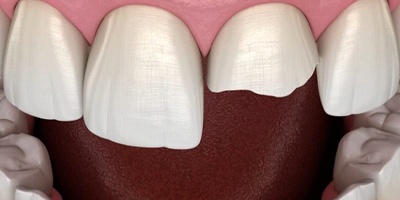Direct Bonding
Invest in a Beautiful Smile
If you’re not in love with your smile, you don’t need to feel insecure about your cosmetic imperfections. You can significantly improve the appearance of your teeth using a minimally invasive procedure. Your cosmetic dentist, Dr. Lori Anderson, can correct a variety of flaws with direct bonding. A tooth-colored resin is used to enhance the color, size, shape, and proportion of your teeth without needing a lengthy treatment process. After just one appointment, you can have a radiant smile you’ll want to show off.
What is Direct Bonding?

Direct bonding goes by many different names; however, no matter what you call it, you’ll enjoy amazing results. A composite resin material is applied to a tooth to cover minor aesthetic concerns, like discoloration or a chip. The resin matches your enamel to blend in with your tooth to provide natural-looking results. The procedure doesn’t require you to permanently alter its structure or undergo a lengthy procedure. You can achieve a drastic improvement to your smile after just one visit.
How Does Direct Bonding Work?

After an initial consultation to ensure you’re a candidate for your treatment, you’re scheduled for your cosmetic procedure. Generally, your appointment will take 30 to 60 minutes depending on the number of teeth you’re treating. If you’re improving several teeth, Dr. Anderson might recommend multiple appointments.
A numbing agent may be used to ensure you are comfortable during the procedure, but it often isn’t necessary. Your tooth is cleaned and dried before a weak acid is applied to it to open the pores in your enamel to create a secure bond. The previously shaded resin is placed on your tooth and sculpted into the desired shape. A special light is used to quickly harden it. Dr. Anderson will smooth and polish your tooth before you leave, so you will walk out with a flawless smile.
What are the Benefits of Direct Bonding?

When compared to other cosmetic procedures, direct bonding offers exceptional benefits, such as:
- Natural-looking results that can last for a decade or longer with the right care.
- Correct several issues using a minimally invasive treatment.
- Quick results in as few as 1 appointment.
- Doesn’t require you to permanently alter your tooth.
- Easy maintenance and care.
- More affordable than other elective procedures.
Is Direct Bonding Right for Me?

If you’re embarrassed by minor imperfections with your smile, you might be a candidate for direct bonding. Dr. Anderson will evaluate your teeth and discuss the results you want to achieve to ensure it’s right for you. Many patients are a candidate for the treatment to correct:
- Tooth decay.
- Exposed tooth root.
- Dark tooth discoloration or stains.
- Chips, cracks, or misshapen.
- Small gaps between teeth.
- Shorter than average teeth.
Invest in a Beautiful Smile
If you’re ready to love the smile you see in the mirror, Dr. Anderson can help. Contact our office today to see if you’re a candidate for direct bonding. She’ll transform your smile and your confidence using a solution that looks natural.
Dental Bonding FAQs
Curious about the kind of corrections that can be performed with dental bonding? Are you looking to learn more about the process and its benefits? We’ve heard many questions about bonding over the years, so we decided to take some of the most common ones and provide some helpful, informative answers below that can help give our patients some additional confidence when planning their own cosmetic treatments. If you have additional concerns, please call us.
Is Bonding Similar to Veneers?
In one sense, bonding and veneers are similar because they can both be used to make a wide variety of corrections. However, the procedures themselves are completely different. Veneers are thin shells attached directly to the front of the teeth, and as such small amounts of enamel will have to be removed to make them look natural in the mouth; with dental bonding, no such changes are necessary. Furthermore, it typically takes at least two appointments to place veneers whereas dental bonding can be completed in just one hour. This means veneers are more suitable for extensive corrections while bonding is ideal for minor improvements that only need a “quick fix.”
How Long Will Dental Bonding Last?
The composite resin used in dental bonding can last a very long time before it needs to be reapplied. In many cases, the material has a lifespan of around 10 years. As a rule, the treatment will last longer if you’re practicing proper oral hygiene and taking good care of your teeth in general; that means brushing at least twice a day, not biting down on overly hard foods or objects, and so on. Don’t forget your regular appointments at Anderson Dental. We can check on the status of the bonding material and give it a touch-up as needed.
Will Others Be Able to Tell That the Tooth Was Bonded?
Most people meeting you for the first time will be unable to tell the difference between a tooth that was bonded and one that hasn’t been touched up at all. The composite resin will be shaded and molded to blend in with the rest of the smile perfectly to the point where it looks like a completely natural part of the enamel. As such, the only thing anyone will notice is a dazzling, flawless smile. Dr. Anderson always pays close attention to the details to produce the best cosmetic results possible.
Does Cosmetic Bonding Require Specialized Cleaning?
Not at all. A tooth with composite resin applied to it can still be brushed and flossed like any other tooth. Make sure you’re sticking to your regular routine of brushing twice a day and flossing daily, and be sure to visit Dr. Anderson for regular cleanings twice a year. Also, try to limit your intake of dark-colored beverages such as coffee that are known to stain teeth. You should also avoid biting down on ice, popcorn kernels, and other hard foods; they can wear away at the composite resin as well as the rest of the natural tooth.
